I am trying to connect to a remote server that serves certificates using SNI. I noticed that the server is closing connections made when I compile and run code using Java 7 and not when I compile and run it via Java 8.
Below is the code that i made to test this assumption. I switch Java versions and run the code and get different results.
public static void getRequest() throws IOException, NoSuchAlgorithmException, KeyManagementException {
String url = "https://sorry i can not share the exact url because of privacy concerns";
HttpClient client = getClientInstance();
HttpGet request = new HttpGet(url);
HttpResponse response = client.execute(request);
System.out.println("Response Code : "
+ response.getStatusLine().getStatusCode());
BufferedReader rd = new BufferedReader(new InputStreamReader(response.getEntity().getContent()));
StringBuffer result = new StringBuffer();
String line = "";
while ((line = rd.readLine()) != null) {
result.append(line);
}
System.out.println("####### the result is");
System.out.println(result.toString());
}
private static org.apache.http.client.HttpClient getClientInstance() throws KeyManagementException, NoSuchAlgorithmException {
RequestConfig defaultRequestConfig = RequestConfig.copy(RequestConfig.DEFAULT)
.setConnectTimeout(60 * 1000)
.setSocketTimeout(60 * 1000)
.setConnectionRequestTimeout(60 * 1000)
.build();
return HttpClientBuilder.create().setDefaultRequestConfig(defaultRequestConfig).build();
}
Has someone ever experienced such an issue and fixed it? I know the ultimate fix would be to use Java 8 but that's not a task that I can do within my current time constraints since the entire codebase i was debugging is huge and has dependencies that might not work well with Java 7.
The exception being thrown is as below;
*** ClientHello, TLSv1
RandomCookie: GMT: 1472095425 bytes = { 254, 51, 194, 246, 77, 6, 185, 8, 224, 187, 85, 225, 133, 128, 122, 1, 245, 13, 230, 239, 156, 93, 164, 184, 251, 159, 111, 60 }
Session ID: {}
Cipher Suites: [TLS_ECDHE_ECDSA_WITH_AES_128_CBC_SHA, TLS_ECDHE_RSA_WITH_AES_128_CBC_SHA, TLS_RSA_WITH_AES_128_CBC_SHA, TLS_ECDH_ECDSA_WITH_AES_128_CBC_SHA, TLS_ECDH_RSA_WITH_AES_128_CBC_SHA, TLS_DHE_RSA_WITH_AES_128_CBC_SHA, TLS_DHE_DSS_WITH_AES_128_CBC_SHA, TLS_ECDHE_ECDSA_WITH_3DES_EDE_CBC_SHA, TLS_ECDHE_RSA_WITH_3DES_EDE_CBC_SHA, SSL_RSA_WITH_3DES_EDE_CBC_SHA, TLS_ECDH_ECDSA_WITH_3DES_EDE_CBC_SHA, TLS_ECDH_RSA_WITH_3DES_EDE_CBC_SHA, SSL_DHE_RSA_WITH_3DES_EDE_CBC_SHA, SSL_DHE_DSS_WITH_3DES_EDE_CBC_SHA, TLS_ECDHE_ECDSA_WITH_RC4_128_SHA, TLS_ECDHE_RSA_WITH_RC4_128_SHA, SSL_RSA_WITH_RC4_128_SHA, TLS_ECDH_ECDSA_WITH_RC4_128_SHA, TLS_ECDH_RSA_WITH_RC4_128_SHA, SSL_RSA_WITH_RC4_128_MD5, TLS_EMPTY_RENEGOTIATION_INFO_SCSV]
Compression Methods: { 0 }
Extension elliptic_curves, curve names: {secp256r1, sect163k1, sect163r2, secp192r1, secp224r1, sect233k1, sect233r1, sect283k1, sect283r1, secp384r1, sect409k1, sect409r1, secp521r1, sect571k1, sect571r1, secp160k1, secp160r1, secp160r2, sect163r1, secp192k1, sect193r1, sect193r2, secp224k1, sect239k1, secp256k1}
Extension ec_point_formats, formats: [uncompressed]
Extension server_name, server_name: [host_name: lasclev.org]
***
main, WRITE: TLSv1 Handshake, length = 169
main, handling exception: java.net.SocketException: Connection reset
main, SEND TLSv1 ALERT: fatal, description = unexpected_message
main, WRITE: TLSv1 Alert, length = 2
main, Exception sending alert: java.net.SocketException: Broken pipe
main, called closeSocket()
java.net.SocketException: Connection reset
at java.net.SocketInputStream.read(SocketInputStream.java:196)
at java.net.SocketInputStream.read(SocketInputStream.java:122)
at sun.security.ssl.InputRecord.readFully(InputRecord.java:442)
at sun.security.ssl.InputRecord.read(InputRecord.java:480)
at sun.security.ssl.SSLSocketImpl.readRecord(SSLSocketImpl.java:934)
at sun.security.ssl.SSLSocketImpl.performInitialHandshake(SSLSocketImpl.java:1332)
at sun.security.ssl.SSLSocketImpl.startHandshake(SSLSocketImpl.java:1359)
Also below is a screenshot of the SSL Labs test that i carried out earlier.
